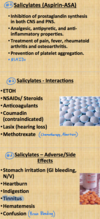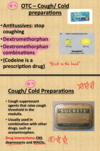Herbals and OTCs Flashcards
Interactions for this type of medicine include ETOH, MAOIs, and CNS depressants.
- ) Analgesics 2.) Salicylates
- ) NSAIDs 4.) Cough / Cold Preparations
- ) Antihistamines 6.) Expectorants
- ) Decongestants 8.) Anti-fungals
Antihistamines ***

Adverse effects of this medication include: affecting lab test values, and if mixed with others, then side effects of those meds (codeine, DM, etc.).
- ) Analgesics 2.) Salicylates
- ) NSAIDs 4.) Cough / Cold Preparations
- ) Antihistamines 6.) Expectorants
- ) Decongestants 8.) Anti-fungals
Expectorants

M.O.A. is shrinking engorged nasal mucous membranes in URI.
- ) Analgesics 2.) Salicylates
- ) NSAIDs 4.) Cough / Cold Preparations
- ) Antihistamines 6.) Expectorants
- ) Decongestants 8.) Anti-fungals
Decongestants

M.O.A. is the inhibition of cyclooxygenase, decreased synthesis of prostaglandins. Used for the treatment of pain / arthritic pain.
- ) Analgesics 2.) Salicylates
- ) NSAIDs 4.) Cough / Cold Preparations
- ) Antihistamines 6.) Expectorants
- ) Decongestants 8.) Anti-fungals
NSAIDs

Interactions for this type of medicine include herbals (ginger, ginkgo, ginseng), ETOH, anti-coagulants, and other OTC analgesics.
- ) Analgesics 2.) Salicylates
- ) NSAIDs 4.) Cough / Cold Preparations
- ) Antihistamines 6.) Expectorants
- ) Decongestants 8.) Anti-fungals
NSAIDs

Interactions for this type of medicine include Coumadin (contraindicated), Lasix (hearing loss), Methotrexate, ETOH, NSAIDs, steroids, and anticoagulants.
- ) Analgesics 2.) Salicylates
- ) NSAIDs 4.) Cough / Cold Preparations
- ) Antihistamines 6.) Expectorants
- ) Decongestants 8.) Anti-fungals
Salicylates

Adverse effects of this medication include: HTN, cardiac/CNS stimulation, can exacerbate hyperthyroid S/S, and rebound vasodilation.
- ) Analgesics 2.) Salicylates
- ) NSAIDs 4.) Cough / Cold Preparations
- ) Antihistamines 6.) Expectorants
- ) Decongestants 8.) Anti-fungals
Decongestants

Interactions for this type of medicine include upset stomach or nausea.
- ) Analgesics 2.) Salicylates
- ) NSAIDs 4.) Cough / Cold Preparations
- ) Antihistamines 6.) Expectorants
- ) Decongestants 8.) Anti-fungals
Expectorants ***

Adverse effects of this medication include GI distress, cramps, gas, PUD, and renal/liver impairment.
- ) Analgesics 2.) Salicylates
- ) NSAIDs 4.) Cough / Cold Preparations
- ) Antihistamines 6.) Expectorants
- ) Decongestants 8.) Anti-fungals
NSAIDs

M.O.A. is a reduction in the viscosity of secretions, promotion of the ejection of mucus from the lungs and trachea. Usually used with cough-cold formulas.
- ) Analgesics 2.) Salicylates
- ) NSAIDs 4.) Cough / Cold Preparations
- ) Antihistamines 6.) Expectorants
- ) Decongestants 8.) Anti-fungals
Expectorants

M.O.A. is blocking H1 receptors. Used to treat sneezing, increased nasal secretions, itching, watering eyes, hay fever, seasonal flu, and colds.
- ) Analgesics 2.) Salicylates
- ) NSAIDs 4.) Cough / Cold Preparations
- ) Antihistamines 6.) Expectorants
- ) Decongestants 8.) Anti-fungals
Antihistamines

Interactions for this type of medicine include ETOH, anticoagulants, and other Rx and OTC drugs that contain acetaminophen.
- ) Analgesics 2.) Salicylates
- ) NSAIDs 4.) Cough / Cold Preparations
- ) Antihistamines 6.) Expectorants
- ) Decongestants 8.) Anti-fungals
Analgesics (acetaminophen / Tylenol)

If the patient experiences continued itching, swelling, vaginal discharge, buring, and irritation, they should report this to their health care provider.
- ) Analgesics 2.) Salicylates
- ) NSAIDs 4.) Cough / Cold Preparations
- ) Antihistamines 6.) Expectorants
- ) Decongestants 8.) Anti-fungals
Anti-fungals

M.O.A. is the inhibition of prostaglandin synthesis in both the CNS and PNS. Has analgesic, antipyretic, and anti-inflammatory properties. Used to treat pain, fever, R.A., and osteoarthritis. Also prevents platelet aggregation.
- ) Analgesics 2.) Salicylates
- ) NSAIDs 4.) Cough / Cold Preparations
- ) Antihistamines 6.) Expectorants
- ) Decongestants 8.) Anti-fungals
Salicylates

Adverse effects of this medication include: constipation, decreased sweating, dysuria, photosensitivity, and dry mouth, nose, and throat.
- ) Analgesics 2.) Salicylates
- ) NSAIDs 4.) Cough / Cold Preparations
- ) Antihistamines 6.) Expectorants
- ) Decongestants 8.) Anti-fungals
Antihistamines

Adverse effects of this medication include: Tinnitus, confusion, stomach irritation (GI bleeding, N/V), hematemesis, and heartburn.
- ) Analgesics 2.) Salicylates
- ) NSAIDs 4.) Cough / Cold Preparations
- ) Antihistamines 6.) Expectorants
- ) Decongestants 8.) Anti-fungals
Salicylates

Interactions for this type of medicine include CNS depressants and MAOIs.
- ) Analgesics 2.) Salicylates
- ) NSAIDs 4.) Cough / Cold Preparations
- ) Antihistamines 6.) Expectorants
- ) Decongestants 8.) Anti-fungals
Cough / Cold Preparations ***

Adverse reactions for this type of medicine are rare, but the patient should report: rash, respiratory problems, hematuria, severe pain in side/low back, and hepatotoxicity.
- ) Analgesics 2.) Salicylates
- ) NSAIDs 4.) Cough / Cold Preparations
- ) Antihistamines 6.) Expectorants
- ) Decongestants 8.) Anti-fungals
Analgesics ***

M.O.A. is to raise the cough threshold in the medulla. Usually used in combination with other drugs, such as acetaminophen.
- ) Analgesics 2.) Salicylates
- ) NSAIDs 4.) Cough / Cold Preparations
- ) Antihistamines 6.) Expectorants
- ) Decongestants 8.) Anti-fungals
Cough / Cold Preparations

Interactions for this type of medicine include mainly adrenergic agents.
- ) Analgesics 2.) Salicylates
- ) NSAIDs 4.) Cough / Cold Preparations
- ) Antihistamines 6.) Expectorants
- ) Decongestants 8.) Anti-fungals
Decongestants ***

When administering this type of medication, nurses need to wash their hands before and after, insert the med high into the vagina, educate the patient to abstain from intercourse of any kind, and use gloves.
- ) Analgesics 2.) Salicylates
- ) NSAIDs 4.) Cough / Cold Preparations
- ) Antihistamines 6.) Expectorants
- ) Decongestants 8.) Anti-fungals
Anti-fungals

M.O.A. is the inhibition of prostaglandin synthesis in the CNS, and the blockage of the generation of peripheral pain impulses. Has antipyretic propterties, but does not have an anti-inflammatory effect.
- ) Analgesics 2.) Salicylates
- ) NSAIDs 4.) Cough / Cold Preparations
- ) Antihistamines 6.) Expectorants
- ) Decongestants 8.) Anti-fungals
Analgesics



